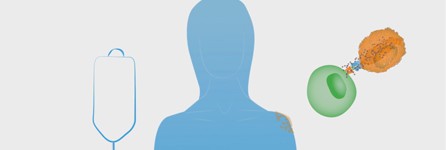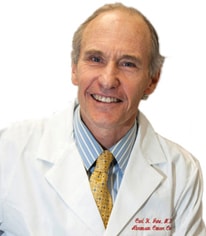
The T cells within our bodies are capable of attacking and eliminating tumors. However, cancer cells can sometimes trick them into not attacking and can even hide from them altogether. To overcome this, scientists have created “bionic” T cells—known as CAR T cells—by taking the patient’s own immune cells and giving them entirely new capabilities through genetic engineering, before putting them back into patients where they are able to target and destroy cancer cells far more efficiently than their natural counterparts.
On Tuesday, three titans of this technological revolution in CAR T cell immunotherapy—Stanley Riddell, MD, Carl June, MD, and Michel Sadelain, MD, PhD—spoke about the amazing results achieved thus far, and about how to make these customized cells even better at eliminating cancer.
Dr. Riddell, who is a member of CRI’s Grants Review Committee, started off the session and highlighted a recent trial in which CAR T cells engineered to target the CD19 receptor achieved remarkable responses in patients with acute lymphoblastic leukemia (ALL) that was resistant to chemotherapy. Out of 29 patients, all responded, and 27 achieved a complete response. This kind of success.—93% of patients’ cancers disappeared completely.—is almost unheard of in treatment of advanced cancers, and is due to the unique features of these CAR T cells.
VIDEO
Normally, T cells can only attack cancer cells through proteins know as HLA, which stands for human leukocyte antigen. Unfortunately, cancer cells often stop producing HLA, and thus become invisible to normal T cells, but not CAR T cells, which are genetically engineered to be able to target cancer cells even if they don’t express HLA.
 Dr. June, who is a member of both CRI’s Scientific Advisory Council and CVC Trials Network, then spoke about his use of CAR T cells to achieve similar success in patients with several types of blood cancers, including young Emily Whitehead, whose story CRI has highlighted before. To take one example, 55 of the 59 relapsed and refractory ALL patients he treated with CAR T cells experienced a complete response within one month of treatment, which matched the 93% complete response rate from Dr. Riddell’s study. More importantly, all 55 of these patients have remained relapse-free after more than a year.
Dr. June, who is a member of both CRI’s Scientific Advisory Council and CVC Trials Network, then spoke about his use of CAR T cells to achieve similar success in patients with several types of blood cancers, including young Emily Whitehead, whose story CRI has highlighted before. To take one example, 55 of the 59 relapsed and refractory ALL patients he treated with CAR T cells experienced a complete response within one month of treatment, which matched the 93% complete response rate from Dr. Riddell’s study. More importantly, all 55 of these patients have remained relapse-free after more than a year.
Furthermore, Dr. June pointed to a new trial that is using anti-PD-1 checkpoint immunotherapy and radiotherapy in combination with CAR T cells to improve their cancer-fighting ability. So far, he has shown that this approach is feasible and also capable of achieving durable responses in patients.
Dr. June finally emphasized that he believes we can still make CAR T cells even better, and presented results showing how additional modifications can produce CAR T cells with extra potency or longer persistence, for instance. This gives doctors greater flexibility to precisely tailor treatments to address different types of cancers.
Dr. Sadelain, a member of CRI’s CVC Trials Network, closed the session by showing how his lab was able to “turbo charge” CAR T cells. He noted that the current CAR T cells can still be suppressed in the body by inhibitory mechanisms and also require activation signals to reach their full anti-tumor potential. Therefore, Dr. Sadelain created CAR T cells that can ignore cancer’s attempts to shut them down, including the PD-1 and CTLA-4 pathways that can suppress T cell responses.
Furthermore, whereas Dr. June showed how CAR T cells could be made either more potent or more persistent, Dr. Sadelain’s group was able to combine each of these properties and take advantage of the best of both worlds.
This session was undoubtedly the one I found the most exciting and futuristic of this entire 2016 AACR conference, and Dr. June was certainly correct when he called these T cells “bionic.” With the ability to customize our already powerful T cells and make them even better at fighting cancer, it truly gave me hope that soon cancer’s days will be numbered.
